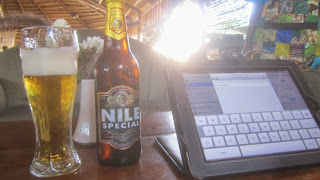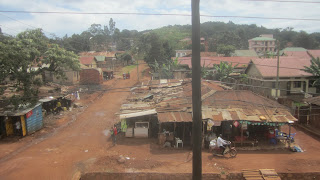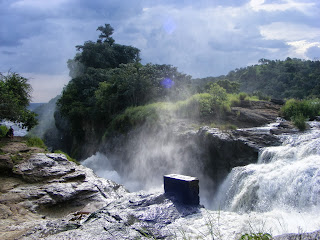Aug 29
I take the morning off, and roll in for the afternoon session. It begins
with
Moses Serubiri giving a paper on Ugandan Identity and the Arts.
Moses is a soft-spoken and, as it turns out, quite brilliant speaker.
He is also a violinist and a photographer. Here's an attempt to capture a
few of his points:
1) The ultimate challenge of the artist is to be unsure of the
Ugandanness that constitutes their identity: "We are as we have been
influenced," says Moses. But he also asks, "What are we influenced by?
What are our choices?" Ugandan indentity is shaped by many influences.
2) In Uganda, there is sectarianism, tribalism, and racism (much, I
would argue, as there is in Canada, or pretty much everywhere I've
traveled). For the writer / artist, difference must be expressed in a
language comprehensible BEYOND the borders in which it has been
produced. Through the language of art, difference can be bridged.
3) Ugandan identity on stage is fluid. A character can change from one
kind of identity to another, depending on circumstances, since Ugandan
identity is shaped by many influences, and is dependent on context.
4) Being an artist involves taking on the identity of the other.
After Moses speaks, others begin to join the conversation.
Binyavanga Wainaina (who has decided to stay for the whole conference, since it's
an AMAZING thing), speaks about how art can create a space for
awkwardness. He speaks of the shyness / shame that so many (maybe all?)
people carry with them, and the need for a mask. Yet the mask is just
that - a cover. Art can look under the mask, at the unguarded human.
Sam Okelo - another Artistic Director, and local force of nature - sums
it up nicely: "One of the things that keeps human beings alive is fear."
To this can be added Ted Hughes' notion that art throughout history has
operated as medicine for a damaged consciousness. We are all, always,
trying to understand how to behave, and we want to get it right because
we are afraid of getting it wrong. And so - as Binyavanga says - we pick
up masks. Art can offer solace, ways of being, comfort, challenge.
Kiki Katese, from Rwanda, says that the first time she felt really alone
was as an artist. But she also speaks of the responsibility of the the
citizen, and that the artist is not exempt from this. Because, as she
says, if we don't pay attention, we will lose ourselves.
But she adds how difficult it is to survive as an artist "in our countries, where we have to prostitute ourselves".
The talk continues and it is fascinating. Is there an African Identity?
Is there an African signature in African work? The room is full of some
of the most articulate, thoughtful, and precise thinkers I have ever
been honored to be in a room with. I am captured by this talk, and
forget to take more notes. Hence the skimpiness of the blog at this
point! But there is a chorus of Canadian chatter at one point when one
of the Ugandans asks, "Do other peoples worry about identity as much as
we do?". The Canadians all practically shout "Yes!" Who we are on this
earth seems to be an ongoing, unsolvable puzzle. But it seems right that
it is the artist who wrestles with it, in ways beyond the sphere of
other forms of human expression, beyond empirical study, journalism and
politics.
Says Donna Michelle St. Bernard, "I try to give your belly something your brain already has".
Aug 29 evening
The evening is Nova.
Nova Bhattacharya dances for us all, and it is
tremendous. She dances three pieces, and speaks between each. The first
is Classical Indian Dance. The second is an early piece of hers, when
she was exploring a contemporary way to use Classical dance in
performance. The final piece was made for Nova by Canadian choreographic
legend Jose Navas. Through the three pieces, we see both the evolution
of Nova's practice, and the incredible skill and depth of her
expression. It is riveting.
Inspired perhaps by all the fascinating talk of the afternoon, Nova
introduces herself as a Canadian, and how tricky it can be to maintain
that simple identity when she dances - how the South Asian-ness of her
appearance, and the form she has trained in (in Canada!), leads others
to assumptions.
Assumption. The part of identity that identity fights against.
Aug 30
The Woman Artist
Today's panel is an examination of She. There are three speakers from
three different countries:
Odile Katese ("Kiki") from Rwanda;
Pamela Acaye (one of thee conference directors) from Uganda; and
Sarah Sunde (a
director and the associate AD of New Georges in NYC), from the USA.
Here are a collection of impressions:
1) Kiki speaks about all she has done in Rwanda - creating the
organization, Professional Dreamers, creating the Women Drummers of
Rwanda, founding a national drum festival, running an International
Theatre Festival: "From the stage, I learned to be active. To make
something from nothing. I had to accept to be stubborn."
2) Sarah speaks about New Georges in New York. It is a theatre with 175
associated directors and writers. They are careful with the language
they use to describe themselves, and say, mostly, that they make plays
that happen to be created by women.
3) Pamela speaks of women's stories. She says that these stories are
everywhere in the environment around us, that every mat, every basket
has a story, perhaps of subjugation, perhaps of rebellion.
The moderator,
Melissa Kiguwa, speaks about the age-old invisibility of
women's words in the world of the published book: "If women are writing,
where are their words?"
The talk turns to moments of oppression, of the obstacles faced by women.
Pamela tells the story of her mother - the second wife of her father.
Pamela's mother gave birth to too many girls, and was judged as
worthless. One day, male relatives came to the house to clear away all
of these useless girls, to throw them into the market, to make their own
way as prostitutes, or, well, whatever. Pamela's mother stood up to the
men, and kept her girls together. The young Pamela watched this, and
something awoke in her - an awareness.
Kiki spoke of poverty, and the women drummers she works with, of learning the despair of women. She says that until she began to work
with them, and understand the pressures of their lives, "I didn't know
how poor they were".
The talk shifts to harm - and how an educated woman who goes into a
community to work with local women, may have to be very careful to not
leave harm, to not create stigma, to not mark these women out for
derision or retribution. A woman named Sophie Alal, artistic director of
Denyu African, speaks of always
asking the question: "How stealthily can I enter a community?" Sarah,
the American, talks about dropping labels: "Women's Theatre" or
"Feminist Theatre", since power accrues to that which doesn't need a
label. I speak about Jackie Maxwell's work at the Shaw Festival, tipping
the male / white balance more towards female / diverse.
Words are spoken of. Kiki says she hates the word "sacrifice". She says she doesn't make sacrifices, she makes choices.
Sophie says she hates the word "empowerment." She says we all have power
inside us. The trick is getting to it. But it's not as if it's not
already there.
Sophie goes on to talk of the idea of sisterhood - that a sisterhood is a
safe place to talk, to enjoy a liberty from other, outside pressures.
This, she says, leads to an awareness of gifts - of the things that are
available to women, that may not be available to men. She speaks of the
sympathy that she discovered for men through sisterhood.
Kiki - who continues to blow everyone away whenever she speaks - sums
everything up perfectly: "We are just ordinary people, doing a crazy
thing, an extraordinary thing." Of the women she works with, and of herself, too, she says that the work is the thing. The work is the focus, and at the end of each day, the artists doing this work, the women making this work, simply go back to their lives. The work is the thing. And this work - art, whatever you want to call it - will affect people however it will.
That's the idea.
Aug 30 Evening
White Rabbit, Red Rabbit
We all gather for the sub-Sarahan premiere of Iranian Nassim
Soleimanpour's extraordinary
White Rabbit, Red Rabbit. Donna Michelle St.
Bernard bravely volunteers to be the actor for the piece when the
scheduled actor doesn't show. The show is a cold-read, and looks at
issues of art, of being trapped, and of manipulation and enforced obedience -
all in an enormously quirky way. It has travelled the world since I saw a
rehearsal of it in Tehran 2 years ago, and told playwright
Nassim Soleimanpour I wanted to
produce it. Everywhere it goes, this play seems to connect in a visceral
way with the people who experience it together (it is a rare experience
as audience to know that the performer doesn't know anymore than you do
about what is about to happen). This is no exception. There are Rwandan
and American artistic directors in the audience who want to carry on
the tradition of taking these words to their own homes.
We take pictures. We email Nassim. There is only one day left.



















































